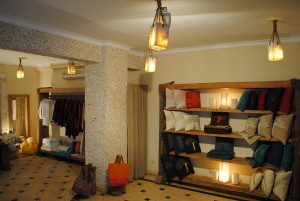
Abdel-Rahman Sherief
Siwa, a desert oasis situated in the east of Egypt, is considered a small piece of paradise on earth, full of fabulous natural landscapes and historical sites and awash with the rich Siwan culture.
A small part of that Siwan culture can now be found in the lofty neighborhood of Zamalek where an aptly-named store, Siwa, features many different types of handmade garments and accessories made by inhabitants of Siwa. The store was launched by Environmental Quality International, EQI, a non-governmental organisation.
The organisation was founded by Laila Neamatalla and her husband Mounir. Both decided to use their vast professional and academic expertise in sociology and ecology to help the underprivileged inhabitants of Siwa.
During a visit to Siwa in 1997, Neamatalla was impressed by the native Siwan garments and fabulous handmade unique embroidery and decided to invest in the traditional Siwan skills to preserve the heritage and ensure the cottage industry would thrive.
The organisation was established 15 years ago with a small workshop where young Siwan girls were taught traditional Siwan embroidery and the style of dressmaking of their ancestors, but the project was hampered by ancient local customs that prohibit young girls from working after marriage. “We train around 300 girls annually, however, only 30 to 40 girls continue working because of the old-fashioned customs that are still adhered to there,” said Maged Nashed, production manager of EQI.
“We try to apply the latest international fashion trends in our production,” Nashed said, pointing out that many Italian and French fashion houses use Siwan embroidery styles in their newest collections. “We deal with Italian and French fashion houses and send them Siwan embroidery produced by Siwan women to adorn their creations.”
The EQI collection used to participate bi-annually in the Maison and Objet Fair in Paris. The organisation’s presence in the fair was supported by the governmental Industry Development Centre but after the revolution the centre withdrew the funding and EQI stopped participating.
“Instead we started to partake in several exhibitions in Jordan, Saudi-Arabia and Bahrain at our expense. While French people prefer our accessories, the Arab customers prefer our garments,” Nashed said. Siwa’s creations are more popular among foreigners than Egyptians and that is why “we did not participate in any local exhibitions after the revolution.”
The Women’s Employment branch of EQI is directed by Neamatalla, whereas Mounir manages the branch that employs Siwan men. Wooden home accessories, date products, frames and statues, chandeliers, and unique objects made from salt extracted from Siwa’s lake are some of the products made by native Siwans under the umbrella of EQI.
In a small workshop that is part of the store in Zamalek a number of women work on finishing the garments that are sent from Siwa before they are put on display. The objects featured in the Siwa store are not cheap, but they are beautiful, fashionable, and unique. By purchasing an item you will not only get to own a part of Siwa’s rich heritage, you will also support a sustainable life for the craftsmen and women of Siwa.




